I’ll be honest—my first real encounter with AI customer support caught me off guard. It was late at night, I had a billing issue, and I expected to wait until the next morning for help. Instead, an AI assistant understood my problem instantly and solved it in minutes. That was the moment I realized AI in support isn’t just hype—it’s changing the game.
Since then, I’ve noticed how more and more businesses use AI to make support faster, smarter, and surprisingly personal. As both a customer and someone working in SaaS, I’ve experienced how much smoother things run when AI handles the heavy lifting. That’s why I decided to share the 10 reasons to switch AI customer support—reasons I’ve lived through myself.
Quick Summary by LiveChatAI 📝
AI isn’t just speeding up support—it’s redefining it. From my own experience, the biggest shift is how effortlessly it delivers 24/7 help, instant answers, and personalization that once felt impossible at scale. With AI, businesses can cut wait times, lower costs, uncover insights, and even predict customer needs before tickets are created. The handoff to humans feels smoother, global support feels easier, and the consistency is unlike anything I’ve seen before. In short, switching to AI customer support in 2025 isn’t a nice-to-have anymore—it’s the smarter, more human choice for both companies and customers.
Reason 1: 24/7 Availability Without the Burnout
One of the first things that convinced me about AI support was how it erased the old “office hours” barrier. I can’t count the times I reached out late at night, expecting nothing more than an automated email saying, “We’ll get back to you soon.” With AI, that wait vanished—I got real help instantly, no matter the time.
Here’s why this matters so much:
- 🌍 Global customers = global hours. Time zones stop being a problem.
- ⏰ No waiting for the next shift. Help is available exactly when it’s needed.
- 🧑💻 No agent burnout. Human teams don’t have to be “always on.”
For me, the biggest benefit was peace of mind. It wasn’t just about getting faster answers—it was about knowing I could rely on support whenever I needed it. That kind of availability sets a whole new standard for customer experience, and once I got used to it, I never wanted to go back.
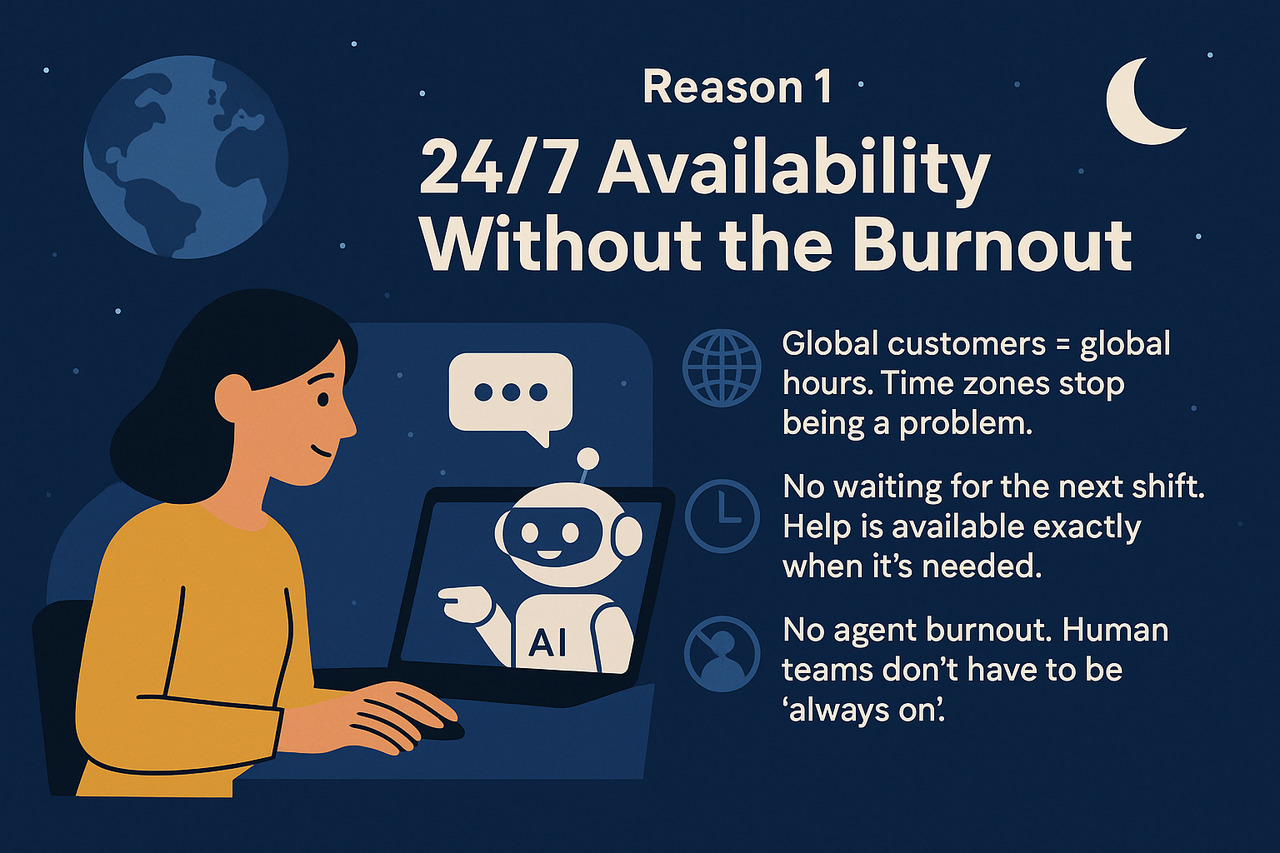
Reason 2: Faster Response Times That Customers Actually Notice
If there’s one thing that frustrates me most as a customer, it’s waiting. I’ve sat in chat queues watching the little typing dots for what felt like forever, only to get a canned response. When I first tried AI support, the difference was night and day—it answered instantly, and not with fluff, but with actual solutions.
Here’s what stood out to me:
- ⚡ Immediate responses. No queue, no “your ticket has been received.” Just answers.
- 📉 Lower frustration. Waiting even a few minutes can turn a small issue into a big complaint.
- 📊 Efficiency boost. Quick replies mean agents spend more time on complex cases, not copy-pasting FAQs.
I honestly didn’t expect speed to have such an impact, but it changed the whole vibe of my interaction. Instead of feeling ignored, I felt taken care of right away. And if you ask me, that kind of response time is something every customer notices—and remembers.

Reason 3: Scaling Support Without Scaling Costs
I’ve worked with growing teams long enough to know this: as customer numbers rise, so do support costs. Hiring, training, and managing a bigger support crew isn’t just expensive—it’s exhausting. What struck me about AI is how it changes that equation. Suddenly, scaling no longer means multiplying headcount at the same pace.
Here’s how I’ve seen AI make scaling less painful:
- 💰 Lower hiring costs. One AI assistant can handle the workload of dozens of repetitive inquiries.
- 📈 Elastic capacity. Whether it’s 10 chats or 1,000, AI doesn’t break a sweat.
- 🛠 Faster onboarding. No need to constantly train new hires for basic questions—AI already knows them.
- 🧑🤝🧑 Humans do the high-value work. Agents focus on nuanced, complex cases where empathy is critical.
For me, the big win was seeing how a small business could serve customers at the same level as a much larger company—without breaking the budget. Instead of ballooning costs, AI support grows with you. And honestly, that’s a relief for anyone trying to keep both customers and finances happy.
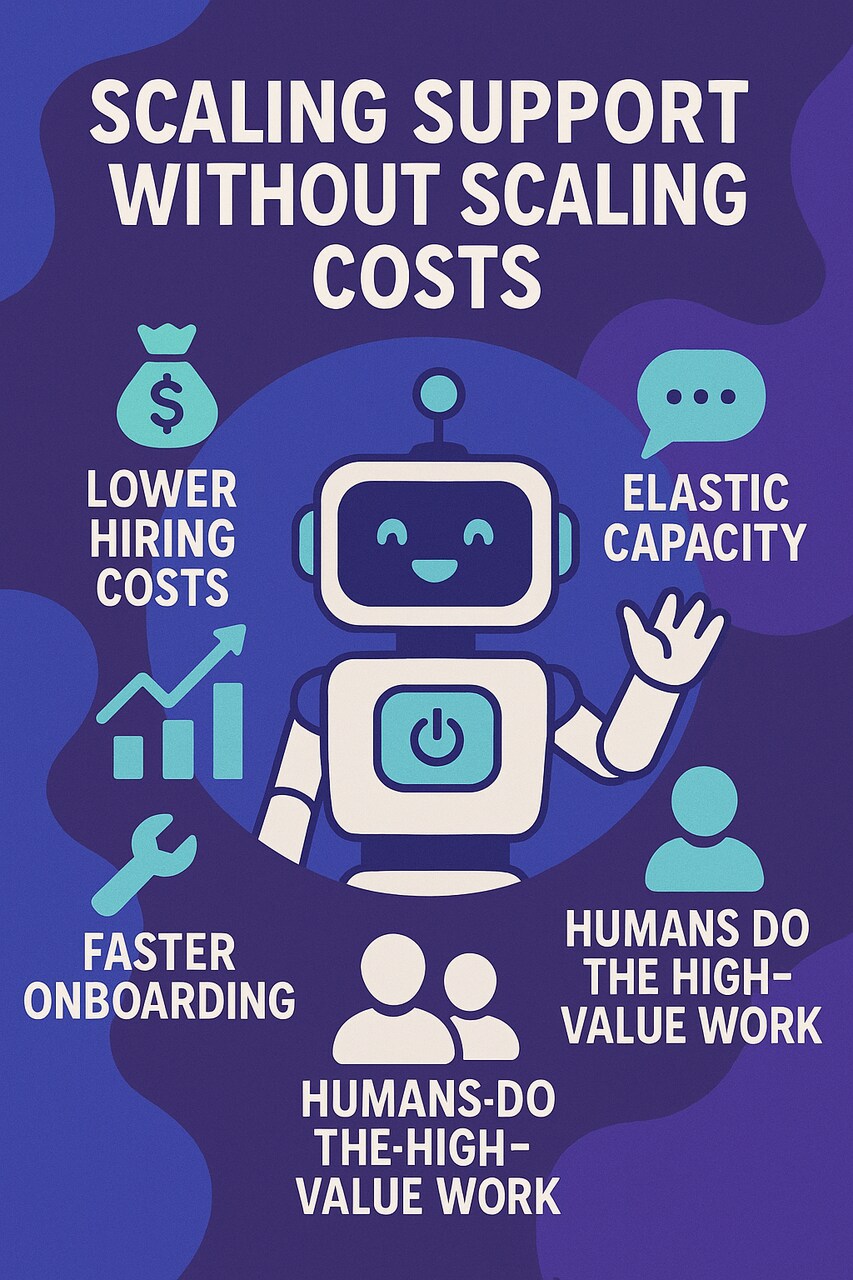
Reason 4: Personalized Experiences at Scale
One of the things I used to dislike about old-school chatbots was how robotic they felt. No matter what I asked, the answers sounded like they were ripped from a script. My first experience with AI-powered support felt different—it remembered me. It pulled context from past interactions and tailored its responses in a way that actually felt personal.
Here’s what stood out:
- 🎯 Context awareness. AI recalls my previous chats, so I don’t have to repeat myself.
- 💬 Relevant suggestions. Instead of random links, it recommends solutions that fit my exact issue.
- 🛒 Smart upsells. I once asked about shipping delays, and the AI reminded me of an express option I had overlooked.
- 🤝 Feels human. The tone and flow adapt to match the conversation, not force me into rigid paths.
What I found most surprising is that personalization doesn’t just make the conversation smoother—it builds trust. When support feels like it knows me (without being creepy), I’m more likely to stay loyal. And that’s something traditional, one-size-fits-all scripts could never achieve.

Reason 5: Consistency in Every Interaction
Before AI, my support experience was hit or miss. One agent would be super helpful, and the next would leave me more confused than before. I’ve had to re-explain my problem to three different people in the same company—it’s exhausting. When I started using AI-powered support, that inconsistency practically disappeared.
Here’s why consistency matters so much:
- 🧩 Standardized answers. AI gives the same clear explanation every time, no matter who’s asking.
- 🔄 No repeat stories. My issue doesn’t get lost between agents—the system already knows the context.
- ✅ Fewer mistakes. Human error happens, but AI sticks to verified information.
- 🌟 Reliable experience. Whether it’s my first ticket or my fiftieth, I know what to expect.
For me, that reliability built confidence. Instead of rolling the dice with every new conversation, I trust that the support I get will be accurate and consistent. And in today’s world, that kind of dependability feels priceless.
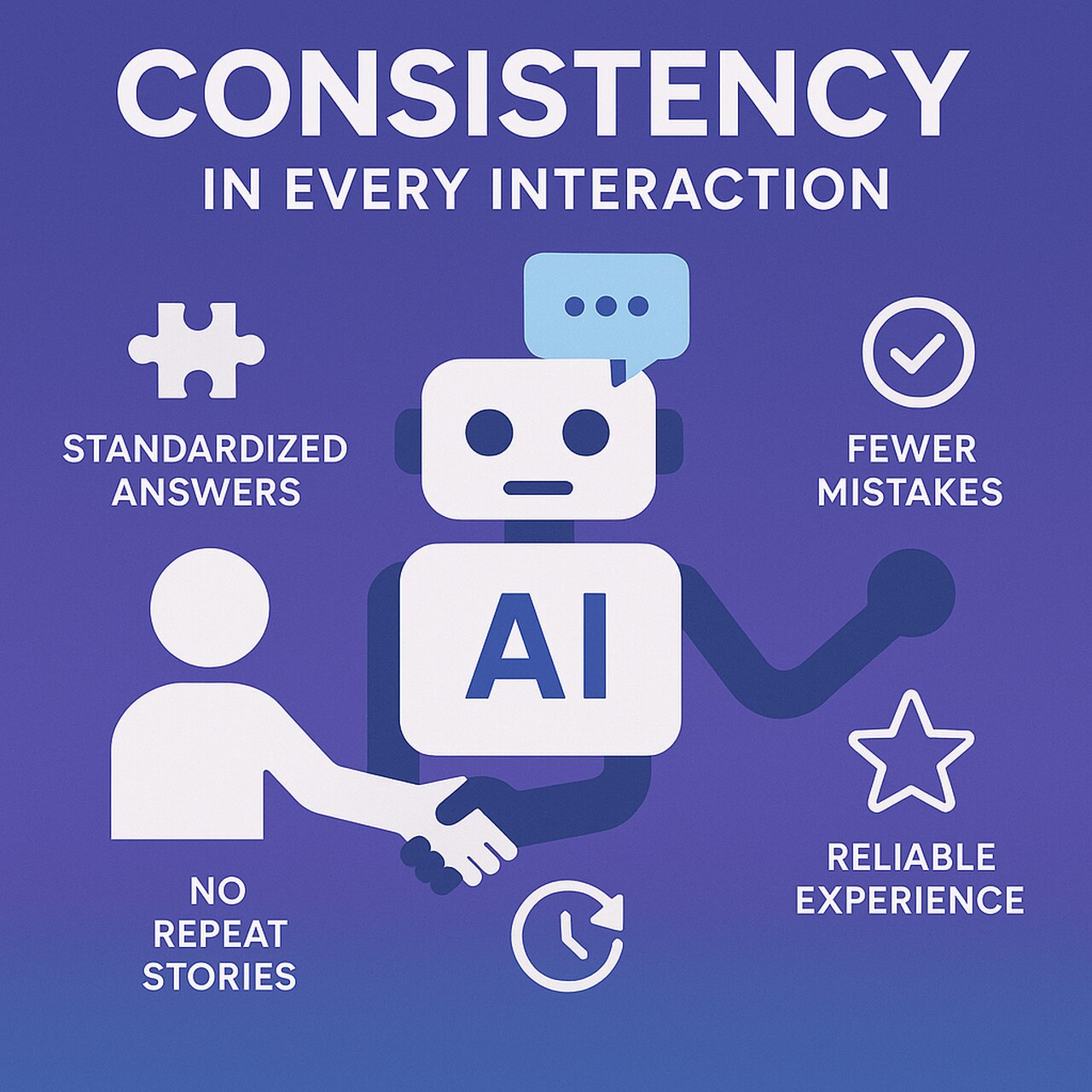
Reason 6: Data-Driven Insights You’d Otherwise Miss
One thing I didn’t expect from AI support was how much it could teach me about my own customers. As a customer myself, I always thought of support as a one-way street—I ask, they answer. But when I saw AI in action on the business side, it blew my mind how many hidden insights it could surface.
Here’s what I mean:
- 📊 Spotting patterns. AI highlights recurring issues (like shipping delays or login errors) that I might have overlooked.
- 🔍 Customer sentiment. It detects if people are frustrated, confused, or satisfied—something I can’t always measure manually.
- 🗂 Topic clustering. Instead of random tickets, AI groups issues into themes that reveal bigger problems.
- 🚀 Predictive trends. It doesn’t just show what’s happening—it hints at what’s about to happen.
I still remember when AI flagged a small but recurring complaint that kept popping up. Honestly, I might have brushed it off, but the data showed it was affecting dozens of customers. Fixing it improved the experience for everyone, and I would have completely missed it without AI. That’s when I realized support isn’t just about solving problems—it’s about learning from them.
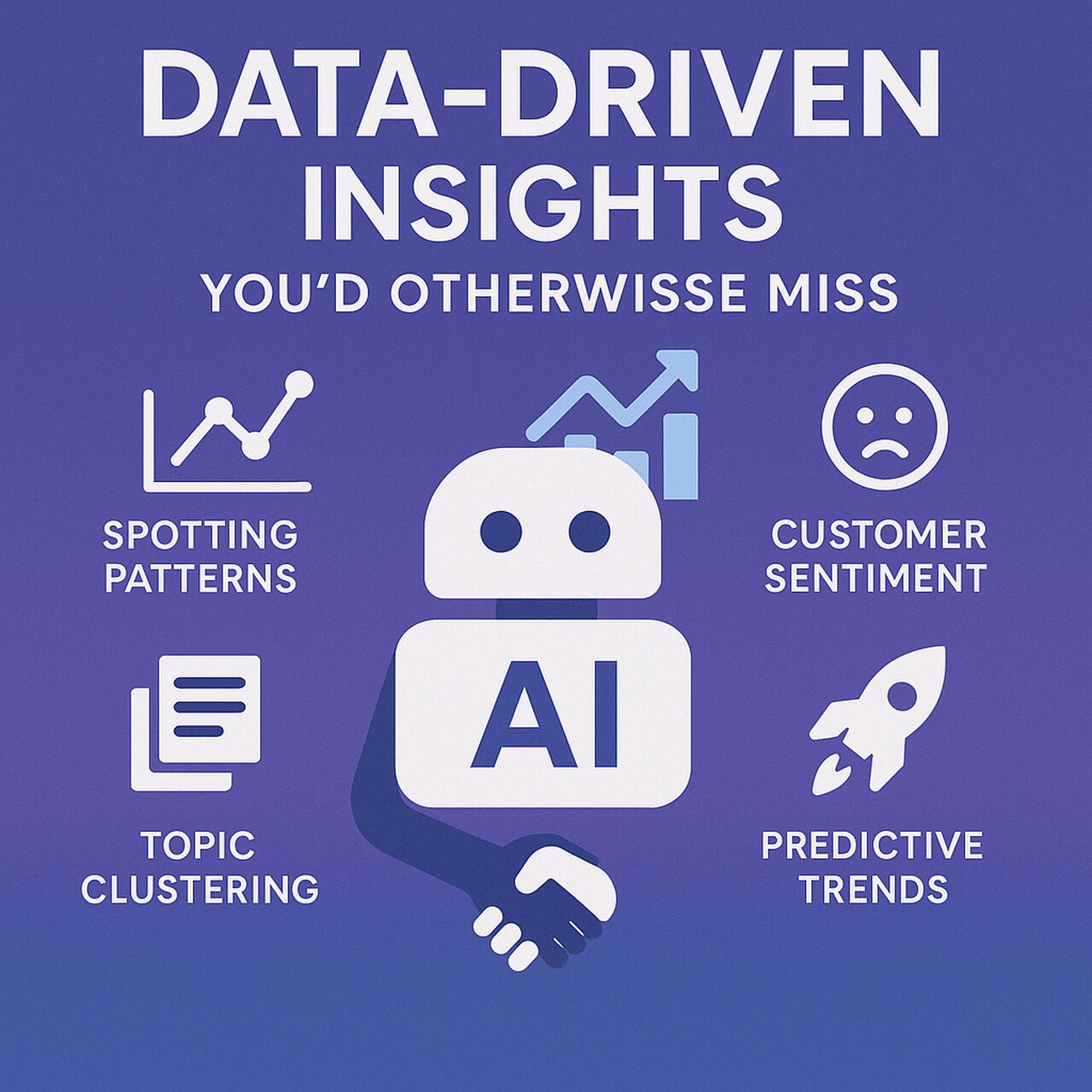
Reason 7: Proactive Support That Surprises Customers
I’ll be honest—most of the time I only contact support when something goes wrong. But the first time an AI assistant reached out before I even noticed a problem, I was genuinely impressed. It warned me about a shipping delay and gave me alternatives right away. Instead of frustration, I felt taken care of.
Here’s why proactive support matters:
- 🔮 Predicting issues. AI spots problems (like outages or errors) before they spread.
- 📢 Proactive alerts. Customers hear about updates and fixes without needing to ask.
- 💡 Smart recommendations. If I’m stuck halfway through a process, AI offers tips right on time.
- 🙌 Customer delight. Surprises build loyalty—people remember when you go the extra mile.
For me, that proactive touch flipped the script. Instead of chasing answers, I got the sense that the company was already looking out for me. And that’s a powerful reason to switch to AI support—it doesn’t just respond, it anticipates.

Reason 8: Seamless Handoffs Between AI and Humans
One of my biggest fears with AI support was getting stuck in an endless loop. You know the type—“Did that answer your question?” over and over until you give up. But the best AI support I’ve used doesn’t pretend to know everything. When it hits its limit, it passes me over to a human smoothly—without me having to start from scratch.
Here’s what makes the handoff so valuable:
- 🤖➡️👩💼 AI knows its limits. It doesn’t waste my time trying to solve what it can’t.
- 📝 Context transfer. The human agent already sees the conversation history—no need for me to repeat myself.
- 🎯 Right timing. I get routed to a person only when it’s truly necessary.
- 🧑🤝🧑 Balanced teamwork. AI handles the routine, humans bring the empathy and nuance.
I can’t tell you how much smoother it feels when I don’t have to re-explain everything. That blend of speed from AI and empathy from humans gives me the best of both worlds. And honestly, it’s why I stopped worrying about “bots taking over”—when done right, it’s more collaboration than replacement.

Reason 9: Multilingual Support Without Hiring an Army
I remember the first time I saw AI instantly reply in Spanish when the customer typed in English. It wasn’t a copy-paste translation—it actually understood the intent and kept the flow natural. For someone like me who has worked with global customers, that moment felt like magic. Instead of scrambling to find bilingual agents, the AI just handled it.
Here’s what I’ve found makes multilingual AI support a game changer:
- 🌐 Global reach. Customers can interact in their own language—no matter where they’re from.
- 🗣 Real-time translation. No delays, no awkward phrasing, just smooth conversations.
- 💸 Lower costs. No need to hire a huge team of multilingual agents.
- 🙋 Inclusivity. Customers feel welcomed and understood, not forced to adapt.
What struck me most was the confidence it gave me in serving international visitors. Instead of worrying about language gaps, I could focus on actually solving problems. For me, that’s not just convenience—it’s connection. And it’s something I couldn’t imagine scaling without AI.
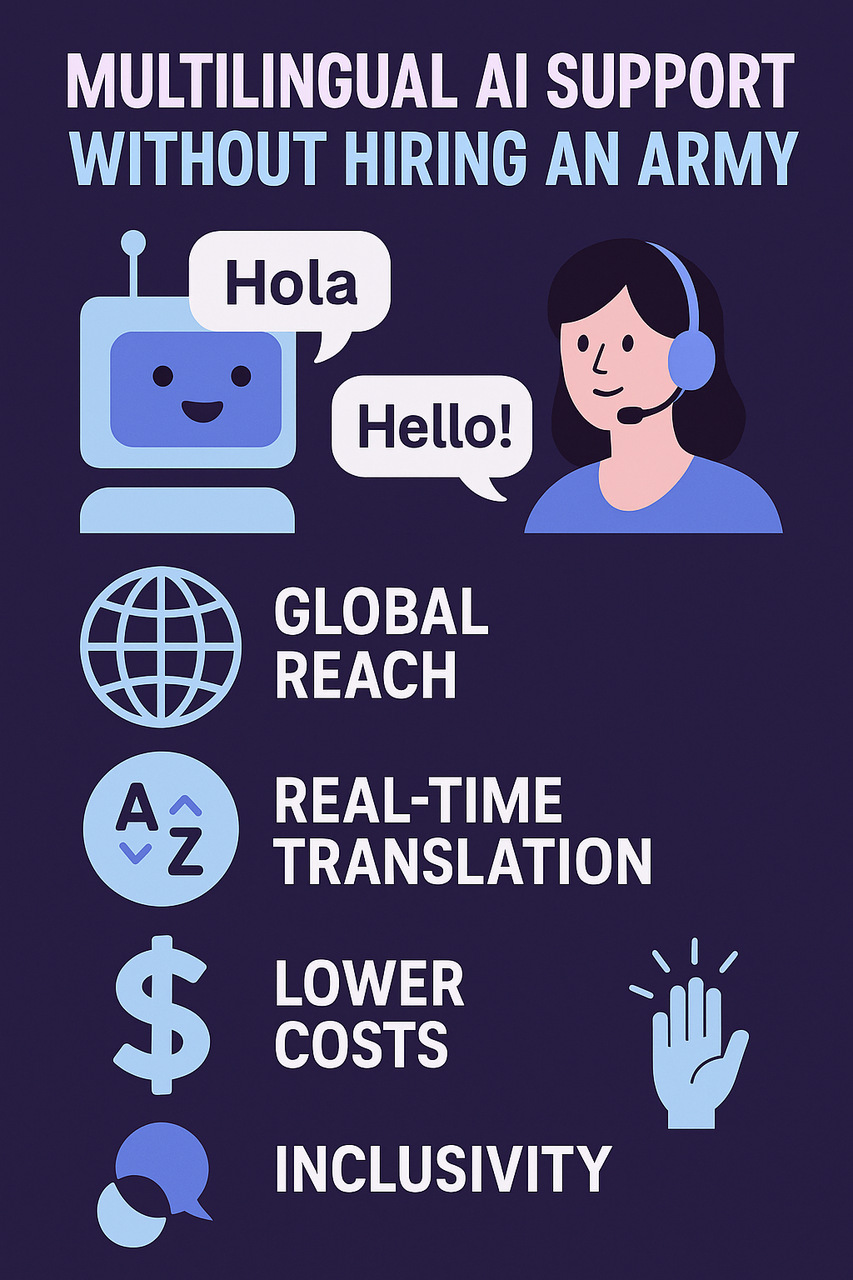
Reason 10: Staying Competitive in 2025 and Beyond
The more I’ve watched the customer support space evolve, the more convinced I am that AI isn’t just a “nice upgrade”—it’s becoming the baseline. Customers expect instant replies, 24/7 help, and consistent service. If a business doesn’t offer that, they risk falling behind competitors who do. I’ve personally chosen to stick with brands that give me smooth AI-powered support, simply because it makes my life easier.
Here’s what makes AI essential for staying competitive:
- 🏆 Customer expectations are higher. People now see AI support as the norm, not the exception.
- 📊 Industry trends point forward. Research firms predict AI will handle the majority of first-level interactions in just a few years.
- 🚀 Faster innovation cycles. Businesses using AI can adapt quicker to customer needs and market changes.
- 💡 Future-proofing. Adopting AI today means being ready for tomorrow’s expectations.
From my perspective, not switching to AI support isn’t just missing out on efficiency—it’s taking a risk with customer loyalty. In 2025 and beyond, AI isn’t about replacing humans; it’s about keeping pace with a world that won’t slow down.

The Bigger Picture: AI Support as a Long-Term Partner
After going through all these reasons, one thing has become clear to me: AI in customer support isn’t just about fixing today’s problems—it’s about preparing for the future. When I think back to my first AI interaction, it felt like a shortcut. But now, I see it more as a foundation that businesses can build on for years to come.
AI doesn’t have to replace the human side of support—it complements it. For me, the best experiences always came when AI handled the repetitive, routine work and freed people to focus on empathy, creativity, and complex issues. It’s not “AI versus humans,” it’s “AI with humans.”
Here’s how I think of it:
- 🔑 Short-term wins. Faster responses, lower costs, happier customers.
- 🌱 Long-term growth. Rich insights, proactive support, and scalability without burnout.
- 🧭 Future readiness. A flexible foundation that adapts as customer expectations change.
When I look at it this way, switching to AI support isn’t just about efficiency—it’s about building a customer experience strategy that can last. That’s why, in my mind, AI isn’t just a tool—it’s a long-term partner.
LiveChatAI — How I Put These Ideas Into Practice
Reading about AI support is one thing, but experiencing it firsthand is what really changed my perspective. For me, that came through trying LiveChatAI. It wasn’t just the 24/7 replies or the faster response times—it was the way the system blended AI with human agents so naturally. I didn’t have to re-explain my problem, and the transition between bot and human felt seamless.
Here’s what stood out to me when I used LiveChatAI:
- 🤖 Smart automation. It handled FAQs and routine requests instantly.
- 📊 Analytics built in. I could see which questions popped up most often and where customers needed more help.
- 🌍 Global-friendly. Customers could chat in different languages without me hiring multilingual staff.
- 🙌 Human + AI teamwork. When needed, a human agent jumped in with full context, making the process painless.
If you’re curious about switching to AI customer support, LiveChatAI is a great place to start. It shows how the benefits I’ve described—speed, personalization, scalability, and consistency—work together in real life. And honestly, after using it, I couldn’t imagine going back to the old “ticket-and-wait” model.
Conclusion — Why I’d Never Go Back to “Human-Only” Support
Looking back at my own experiences, I can honestly say I wouldn’t want to return to the old way of customer support. The long queues, the limited hours, the inconsistent answers—it feels outdated now that I’ve seen what AI can do. With AI, I get the speed, the personalization, and the reliability that I’ve always wanted as a customer.
That doesn’t mean I don’t value human agents. Quite the opposite—AI has made me appreciate them more. By handling the routine stuff, AI gives people the space to show empathy and creativity where it matters most. To me, that’s the perfect balance.
So if you’re still on the fence, here’s my take: switching to AI customer support isn’t just about technology—it’s about meeting your customers where they are today. And once you experience it, like I did, you’ll wonder why you didn’t make the move sooner.
Frequently Asked Questions
1. Is AI customer support replacing humans completely?
Not at all. From my own experience, the best results come when AI and humans work together. AI handles the repetitive, routine stuff while humans step in for complex, emotional, or sensitive issues. It’s more about balance than replacement.
2. How safe is AI with customer data?
This was one of my first concerns too. Modern AI systems are designed with strict compliance standards like GDPR and CCPA in mind. As long as companies set up clear privacy policies and use secure platforms, customer data stays protected.
3. What industries benefit most from AI support?
Honestly, any business with customer interactions can benefit. I’ve seen it work beautifully in e-commerce, SaaS, travel, and even healthcare. If customers have questions and expect quick answers, AI support can make an impact.
4. How expensive is it to switch to AI support?
Surprisingly, not as much as I once thought. The cost often balances out quickly because AI reduces the need for extra hires and cuts down response times. In my experience, the return on investment shows up faster than expected.
5. Can small businesses really benefit, or is this just for big companies?
Absolutely, small businesses can benefit—maybe even more than big ones. I’ve seen small teams scale their customer support with AI without hiring dozens of new agents. For them, AI levels the playing field and makes them look just as responsive as larger competitors.
Check out these blog posts as well:




